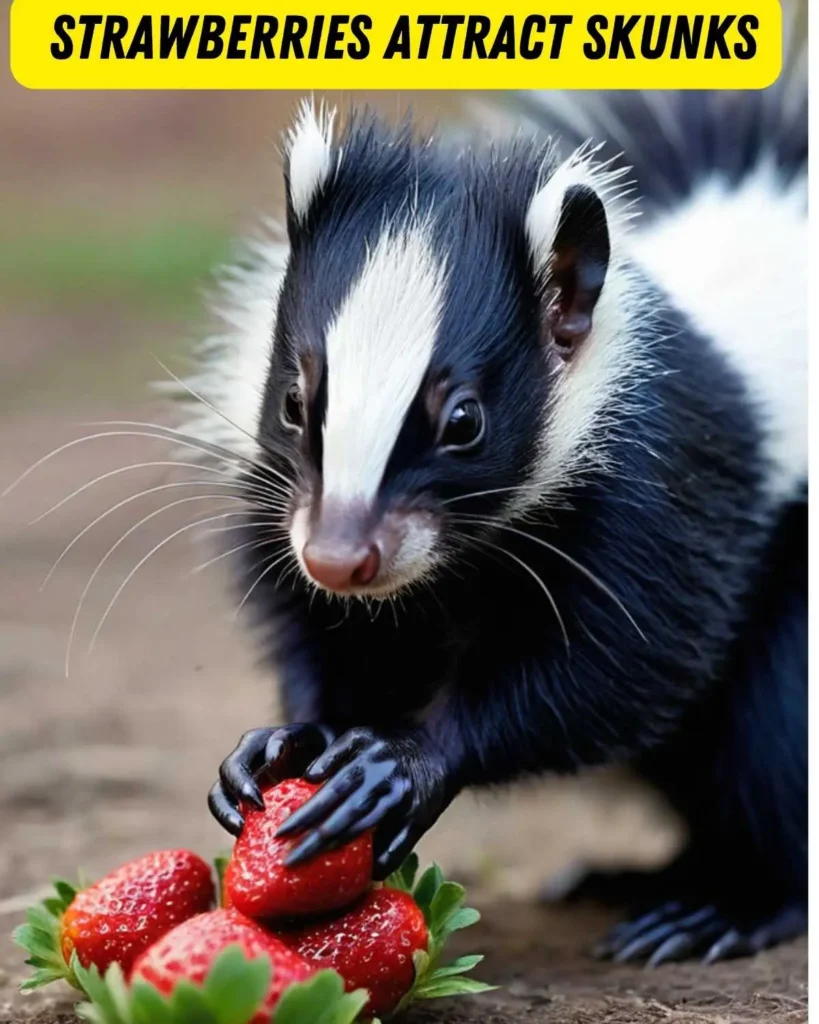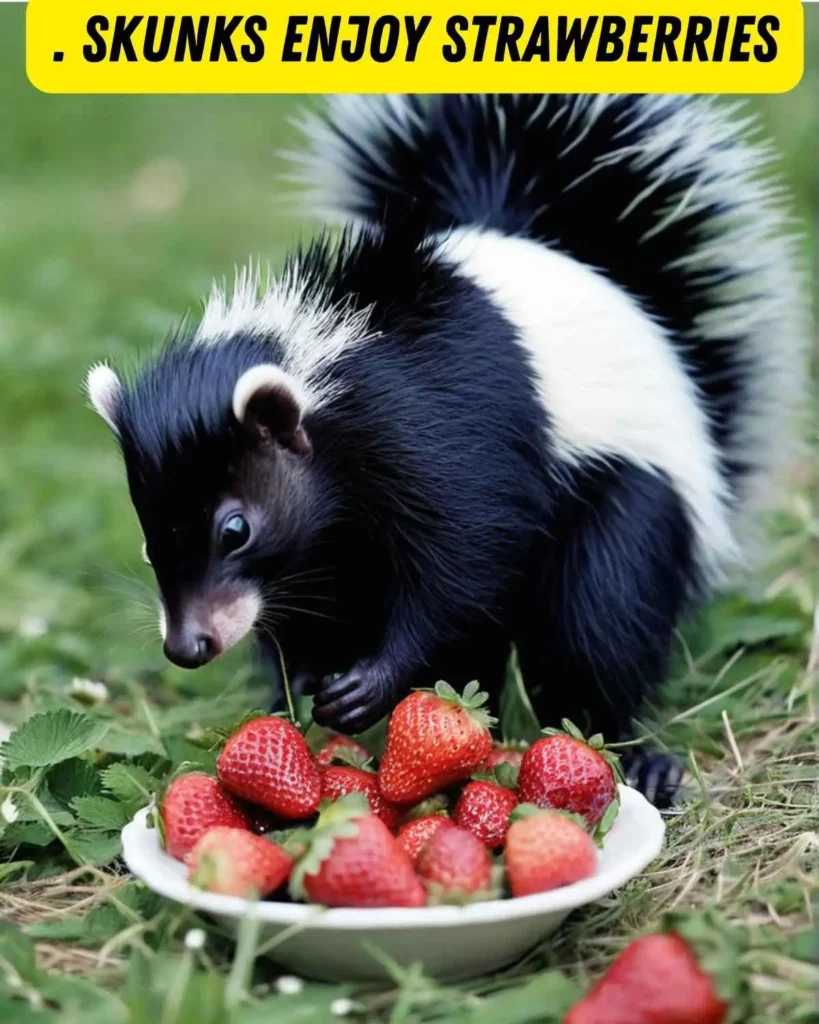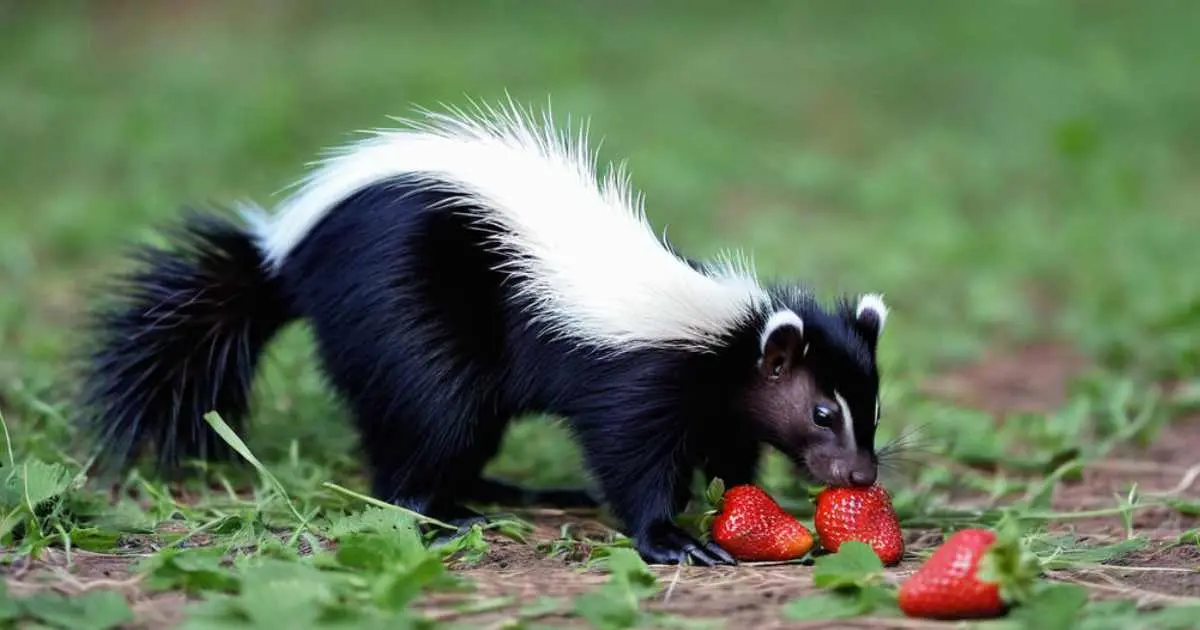Can Skunks Eat Strawberries? The Truth Revealed
Last updated on August 29th, 2024 at 08:47 am
You won’t believe it, but skunks eat strawberries! In my research as a skunk pet owner and observer of wildlife, I’ve discovered that skunks love these sweet, juicy fruits. Skunks are omnivores, so they eat both plants and animals, and strawberries provide them with a tasty and nutritious snack. If you’re curious about what else skunks eat and how to keep them out of your strawberry patch, keep reading for more interesting facts!
The Dietary Habits Of Skunks
Curious about what skunks munch on during their nightly forays? While these small creatures may be best known for their pungent defense mechanism, their diet is quite diverse and includes some unexpected treats. Let’s dive into the dietary habits of skunks and discover their penchant for gardens, including whether they fancy a strawberry snack or two!
Foods In A Skunk’s Diet
Skunks are not picky eaters and their menu is quite varied, which helps them adapt to different environments. Here’s a breakdown of typical food choices:
- Insects: Be it beetles, bees, or ants, they’re all on the table!
- Small rodents: Mice and rats can become a skunk’s meal.
- Eggs: These scavengers often raid nests for a protein fix.
- Fruits and Berries: Yes, skunks do eat strawberries when available, along with other garden delights.
- Garbage: Human trash provides a buffet of leftovers for skunks.
Omnivorous Nature Of Skunks
Skunks are omnivores, meaning they eat both plants and animals. Their flexible diet includes:
| Plant-Based Foods | Animal-Based Foods |
|---|---|
| Fruits (like strawberries) | Insects |
| Nuts and seeds | Small mammals |
| Grains | Amphibians and reptiles |
| Leaves | Bird eggs |
With such diverse choices, skunks can thrive in various habitats. The omnivorous nature of skunks serves them well in the wild, making them opportunistic feeders ready to enjoy whatever nature offers, including those juicy strawberries from your garden!
The Allure Of Strawberries
Imagine a ripe, red strawberry, bursting with sweetness and scent. This berry does not just tempt humans. Skunks find strawberries irresistible.
Why Strawberries Attract Skunks
Strawberries give off a strong, fresh aroma. This scent lures skunks from afar. Their sharp noses detect these berries easily. Plus, strawberries are often at ground level. This makes them perfect for a skunk’s diet.

Not only do strawberries appeal to the skunk’s sense of smell, but the bright color signals a tasty treat. Skunks look for easy, nutritious food. Strawberries fit this need perfectly.
Nutritional Benefits For Skunks
Strawberries are rich in vitamins. Skunks need these for health. The vitamin C in strawberries is vital for healing and immunity. They also provide fiber, aiding in digestion.
| Nutrient | Benefit |
|---|---|
| Vitamin C | Immunity boost |
| Folic Acid | Cell growth |
| Fiber | Better digestion |
| Sugars | Quick energy |
Let’s explore deeper why these juicy fruits are a skunk’s delight.
Skunks In Your Garden
Imagine walking into your garden and finding half-eaten strawberries. You might wonder who the culprits are. Often, skunks are to blame. These black and white creatures may look adorable, but they can turn your garden into their personal buffet. Let’s dig into how you can spot if skunks are enjoying your strawberries more than you are.
Signs Of Skunk Presence
Skunks leave telltale signs of their visits. Here’s what to look for:
- Digging: Skunks dig cone-shaped holes in the ground to find food.
- Odor: Their distinctive spray is a clear giveaway. You’ll detect this strong scent easily.
- Tracks: Skunk footprints show five toes on each foot, much like a miniature bear print.
- Skunk droppings: Their waste often contains undigested food like seeds.
Skunks And Fruit Consumption
Skunks are not picky eaters. While they usually eat insects and grubs, fruit also is on their menu. Strawberries offer a juicy treat for them. Here are more details about skunks and their fruit-eating habits:
| Fruit Type | Likelihood of Consumption |
|---|---|
| Strawberries | High |
| Grapes | Medium |
| Cherries | Medium |
| Apples | Low |
Strawberries are a favorite for skunks because of their size and how easy they are to reach. They might eat them whole or leave half-eaten fruits behind. If you grow strawberries, expect skunks to visit often during the ripening season.
Protecting Your Strawberries
Love fresh strawberries from your garden? So do skunks! These cute yet pesky creatures find strawberries irresistible. Keeping skunks away is vital. Let’s make sure these berries stay on your table, not in a skunk’s belly. Learn how to shield your strawberry patch with effective deterrents and natural barriers.
Effective Deterrents
Startle skunks with motion-activated sprinklers. Odor repellents like citrus peels deter them too. Commercial repellents with natural ingredients work. Bright lights can scare skunks at night. Installing fencing that digs into the ground keeps skunks out. Secure your garden and enjoy ripe strawberries anytime!
Natural Barriers Against Skunks
Creativity and nature offer excellent skunk barriers. Plant thorny bushes around your strawberries. Skunks don’t like getting pricked. Create a pebble border; it’s tough on their feet. Strong-scented herbs like mint or basil also repel them. Use these natural shields to create a fortress around your garden!
When Skunks Become Pests
Imagine walking into your garden and feeling the excitement of seeing ripe, juicy strawberries, only to find that a skunk has made a feast of them. Skunks, with their distinct black and white markings, are not just known for their pungent odor; these creatures are also known for their varied appetite which includes succulent strawberries. While skunks play a role in the ecosystem, they can become pests when they invade gardens and homes in search of food, causing destruction and unease.
Dealing With Skunk Intrusions
Understanding Skunk Behavior: Skunks are mostly nocturnal, foraging at night. They eat plants, insects, and small animals. Protect Your Garden: To safeguard strawberries, install fences and remove food sources. Avoid Surprises: Illuminate gardens at night to deter these shy animals.
- Install a tight fence, burying it a few inches underground.
- Seal garbage lids and do not leave pet food outside.
- Use motion-activated lights to startle and keep skunks away.
Safe Removal Of Skunks
Do Not Threaten: Cornering a skunk may trigger it to spray. Professional Help: Wildlife experts can remove skunks safely. Chemical-Free Repellents: Use natural deterrents to avoid harm.
- Place ammonia-soaked rags near skunk entry points to repel them.
- Install a motion-activated water sprinkler for a harmless scare.
- Contact Wildlife Control for humane skunk removal.
Understanding Skunk Behavior
Skunks are known for their distinctive black and white fur and their ability to spray a foul-smelling liquid as a defense mechanism. Understanding their behavior, especially their feeding habits, can provide valuable insights into how they interact with their environment and what impacts their dietary choices.
Skunk Feeding Patterns
Skunks are omnivorous creatures, meaning they eat both plants and animals. Their diet is quite varied and includes insects, rodents, small birds, eggs, fruits, and nuts. Specifically, strawberries are a favorite among many skunks.
The diet composition of skunks often depends on availability and ease of access. Gardens and wild spaces with fruit can attract skunks. Here’s what you might find on a skunk’s menu:
- Insects: Beetles, bees, and crickets.
- Small mammals: Voles, mice, and shrews.
- Fruits: Berries, including strawberries, are a sweet treat.
- Plants: Leaves and roots are on the list too.
Seasonal Diet Changes
As seasons change, so does the skunk’s diet. In spring and summer, skunks enjoy fresh vegetation and ripe fruits.
| Season | Main Food Source | Examples |
|---|---|---|
| Spring | Insects & Plants | Grubs, beetles, wildflowers |
| Summer | Fruits & Small Mammals | Strawberries, mice |
| Fall | Nuts & Fruits | Acorns, berries |
| Winter | Stored Body Fat | Less active, less food |
Strawberries become a popular choice in the summer when they are abundant and sweet. Skunks may eat these fruits more during this time, often foraging at night. This behavior can result in skunks visiting backyards and gardens where strawberries are grown.
Cultivating A Skunk-friendly Environment
Cultivating a Skunk-Friendly Environment means understanding what skunks love to eat. Skunks enjoy strawberries, among other garden delights. While they provide natural pest control, it’s crucial to manage their presence thoughtfully. A harmonious garden coexists with wildlife while keeping your strawberries safe.

Alternatives To Attract Skunks Away
To maintain a skunk-friendly zone without sacrificing your strawberries, consider these tips:
- Offer natural skunk snacks away from your strawberry patch. Things like fallen fruit or compost can lure them elsewhere.
- Implement dedicated feeding areas to keep skunks satisfied and at a distance from your berries.
- Use cover crops or other plant diversions to lead skunks away.
Creating A Balance In Your Garden
A well-balanced garden respects wildlife’s dietary habits while protecting your fruits. Follow these guidelines:
| Action | Benefit |
|---|---|
| Install fencing around strawberry beds | Limits skunk access, keeps strawberries intact |
| Use motion-activated sprinklers | Gently discourages skunk visits |
| Plant marigolds | Natural repellent due to their scent |
By nurturing the ecosystem, you invite helpful creatures while safeguarding your garden’s fruits.
Case Studies
Do skunks have a sweet tooth for strawberries? This intriguing question leads us to fascinating case studies. Many assume that skunks primarily feast on insects and grubs, but evidence suggests these creatures might also indulge in the sweet goodness of strawberries. Through firsthand accounts from farmers and successful skunk management practices, we’ll explore the unexpected dining habits of these mammals.
Farmers’ Experiences With Skunks
Local farmers have observed skunks in their strawberry fields nibbling on ripe, juicy berries. The nighttime visits often leave behind telltale signs: half-eaten strawberries and small, distinctive paw prints.
| Farm | Strawberry Loss (%) | Skunk Sightings |
|---|---|---|
| Green Valley | 10% | Weekly |
| Sweet Acres | 7% | Bi-weekly |
| Berry Haven | 5% | Monthly |
As shown in the table, skunk activity varies by location but presents a consistent issue for strawberry yield.
Success Stories In Skunk Management
There are proven, humane strategies to reduce skunk visits without harming these striped visitors or the strawberries.
- Fencing: Erecting a skunk-proof fence around the perimeter can significantly lower crop loss.
- Natural deterrents: Skunks dislike certain scents. Planting marigolds or spreading citrus peels can keep them at bay.
- Habitat modification: Removing log piles and sealing holes discourages skunks from settling nearby.
Additional Skunk Favorites
Did you know that skunks enjoy a variety of foods aside from their famed love for strawberries? In fact, skunks aren’t picky eaters at all. These black and white creatures feast on numerous backyard foods that might surprise you.
Common Backyard Foods Enjoyed By Skunks
Skunks take pleasure in more than just strawberries; their diet is quite diverse. Here are some of the other foods that they typically enjoy:
- Insects – Skunks dig for grubs and worms.
- Fruits – They love berries, cherries, and apples.
- Vegetables – Skunks munch on corn, beans, and peas.
- Small Rodents – They can hunt mice and voles.
- Eggs – Skunks often raid bird nests for eggs.
- Garbage – Leftovers in the trash are a treat for them.
How To Use This Knowledge
To protect your garden or to attract these creatures, understanding skunks’ dietary preferences is key. Here’s how you can use this knowledge:
| Goal | Action |
|---|---|
| Protect Your Garden | Secure trash cans, build fencing and pick ripe fruits quickly. |
| Attract Skunks | Leave a small amount of fruits, and create hiding spots. |
Whether you’re trying to charm a skunk into your space or keep them at bay, you can use their love for certain foods to your advantage.
Frequently Asked Questions
Skunks often enjoy eating various fruits, with berries being a particular favorite. They regularly consume blueberries, cherries, and other wild berries.
Skunks primarily enjoy eating insects, grubs, and worms. They also feed on small rodents, berries, and fruits.
Yes, skunks are fond of berries. They often include various berries in their omnivorous diet.
Conclusion
Wrapping up, skunks do indeed fancy strawberries. These bushy-tailed creatures will often snack on ripe, juicy berries if they find them. Remember, while cute, skunks are wild animals. So, planting berries farther from home may prevent surprise encounters. Gardening with wildlife in mind enriches our ecosystem and our understanding of nature’s diverse palate.

